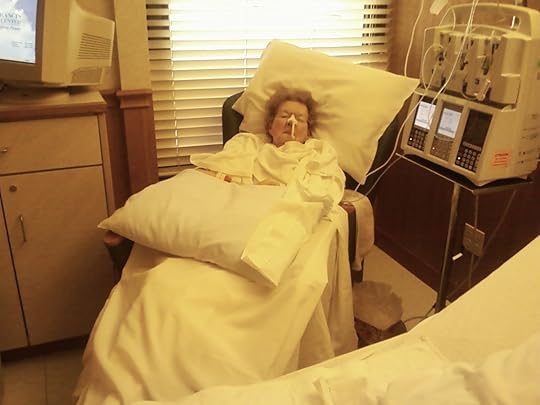Terry Teachout's Blog, page 229
June 16, 2011
TT: Almanac
Larry McMurtry, Lonesome Dove
June 15, 2011
TT: Three cheers for the bad guy
* * *
 If beauty were really only skin deep, then "Spider-Man: Turn Off the Dark" would be the perfect musical. Every cent of the $70 million budget is visible. George Tsypin's sets, Kyle Cooper's digital projections and Eiko Ishioka's costumes have been melded into an exquisitely exact stage equivalent of the sharp-angled, high-contrast drawing style of the Marvel comic books in which Peter Parker and his web-spinning alter ego first came to fictional life. The show's sheer visual dynamism is staggering--but except for one great performance, it has little else to offer. It's the best-looking mediocre musical ever to open on Broadway....
If beauty were really only skin deep, then "Spider-Man: Turn Off the Dark" would be the perfect musical. Every cent of the $70 million budget is visible. George Tsypin's sets, Kyle Cooper's digital projections and Eiko Ishioka's costumes have been melded into an exquisitely exact stage equivalent of the sharp-angled, high-contrast drawing style of the Marvel comic books in which Peter Parker and his web-spinning alter ego first came to fictional life. The show's sheer visual dynamism is staggering--but except for one great performance, it has little else to offer. It's the best-looking mediocre musical ever to open on Broadway....Poetry, not special effects, is the engine that drives lyric theater, and "Spider-Man: Turn Off the Dark" is as unpoetic as you can get. Mr. Aguirre-Sacasa's book is flabby and witless. The score, by U2's Bono and The Edge, sounds like a double album of B-sides ("Don't think about tomorrow/We've only got today"). Not only are the songs forgettable, but they never succeed in generating any dramatic momentum--all they do is get louder. As for Mr. Carney and Ms. Damiano, they're pretty, bland and devoid of charisma....
Outside of the décor, what does "Spider-Man" have going for it? The bad guy. Patrick Page is a classical actor of high distinction whom New York playgoers will remember as the mercurial Henry VIII of the Roundabout Theatre Company's marvelous 2008 revival of "A Man for All Seasons." Mr. Page has a voice like a cathedral organ and enough charisma to blast Mr. Carney off the stage and into the next county, and you can tell that he's having a grand old time playing a super-villain....
* * *
Read the whole thing here .
June 14, 2011
TT: Not while we're around
My mother turned eighty-two today. She didn't expect to spend her birthday in a hospital room, any more than Mrs. T and I expected to spend it sitting by her bed. As usual, I had to plug our annual summertime visit to Smalltown, U.S.A., into the only available hole in my schedule, and the hole in question closed up last Thursday. Our plan was to send flowers from the road. Instead we delivered them in person, which is--needless to say--much nicer.
Now that my mother is feeling better, I can say that her ailment (a perforated bowel) was sufficiently grave that she wasn't expected to live. That she not only survived a major operation but now appears to be flourishing is a sign of the stamina of a woman who was born in the same year that the Great Depression began working its terrible will on America. Life was tough in the Thirties, especially if, like my mother, you grew up on a dirt farm in the middle of nowhere. Anyone who got through the Thirties in one piece isn't likely to be fazed by a perforated bowel, or anything else.
Not surprisingly, Stephen Sondheim wrote a song about it:
I've run the gamut
A to Z.
Three cheers and dammit,
C'est la vie.
I got through all of last year,
And I'm here.
She sure is, for which all of the Teachouts are profoundly grateful today.
* * *
Yvonne De Carlo sings "I'm Still Here" on The David Frost Show:
TT: Almanac
James Agate, Ego 4
TT: Snapshot
(This is the latest in a weekly series of arts-related videos that appear in this space each Wednesday.)
June 13, 2011
TT: Almanac
James Agate, Ego
June 12, 2011
TT: Almanac
Richard Brookhiser, "Rusher and Poetry" (National Review, May 16, 2011)
TT: Songs of ourselves
 Life has been hectic since Mrs. T and I rushed my mother to the hospital last Wednesday for emergency surgery. We'd been planning to drive up to St. Louis on Thursday to see a show, which of course we didn't do, and we expected for the same reason not to return to New York on Friday afternoon. But my mother, like so many veterans of the Great Depression, is much tougher than she looks, and it soon became evident that she was going to fool everybody and get better.
Life has been hectic since Mrs. T and I rushed my mother to the hospital last Wednesday for emergency surgery. We'd been planning to drive up to St. Louis on Thursday to see a show, which of course we didn't do, and we expected for the same reason not to return to New York on Friday afternoon. But my mother, like so many veterans of the Great Depression, is much tougher than she looks, and it soon became evident that she was going to fool everybody and get better.So I flew to New York on schedule, leaving Mrs. T and the rest of my family behind to hold the fort, and saw two shows on Saturday, the long-awaited press preview of Spider-Man: Turn Off the Dark (about which more on Wednesday) and a screening of The Importance of Being Earnest. That done, I caught the first flight back to St. Louis on Sunday morning, rented a car at the airport, and drove to Cape Girardeau to see my mother, who was now sitting up in a chair and chatting happily about her unexpected ordeal.
Not surprisingly, I haven't had much time to read since arriving in Smalltown, U.S.A., nine days ago, but I did manage to knock off two books, Jon Ronson's The Psychopath Test: A Journey Through the Madness Industry and Dominic Shellard's 2003 biography of Kenneth Tynan. At first glance these books would seem to be ill matched, but they turned out to have a fair amount in common.
Ronson's book is, not to put too fine a point on it, irksome. It's also exemplary, a perfect example of what I think of as This American Life-type journalism, a genre in which the author views every aspect of life through the self-aggrandizing prism of his own tediously nebbishy personality. If Woody Allen had modeled himself on Tom Wolfe instead of Ingmar Bergman, he would have written books like The Psychopath Test. Part of what's wrong with journalism today is that a great many journalists, were they to read that sentence out of context, would take it to be a compliment.
Kenneth Tynan, who in the Fifties was England's most influential British drama critic, is no longer widely remembered, though those who know his work won't need to be told that he was a writer of far greater accomplishment and significance than Jon Ronson. Yet Tynan, too, was self-centered in the extreme, and the more you learn about him, the less attractive he becomes, not just as a man but also as a critic.
Tynan summed up his critical point of view as follows:
One would have thought that the notion of an impersonal critic was as patently absurd as that of an impersonal person: yet playwrights still cherish it as a sort of holy ideal. Admittedly, we all make mystiques: but this one is particularly wishful. The man who asks for an anonymous, impersonal criticism is trying to elevate criticism to the status of a science; whereas it is, I am afraid, only an art. The critic's business is to write readable English: the playwright's to write speakable English. Beyond that it is every man for himself.
 It sounds plausible when put so elegantly, but at bottom Tynan is saying that criticism is pure opinion, and he went well out of his way to practice what he preached. He was, as a result, a wildly erratic critic, sometimes inspirational but at least as often arbitrary to the point of perversity, and it was his invariable custom to offer up his prejudices as though they were the revealed word. Thus it isn't surprising that he was a power-seeker who longed desperately to work on the other side of the proscenium--indeed, Tynan abandoned criticism early on to become the first literary manager of the National Theatre under Laurence Olivier--and it's downright funny to learn that the sharpest-tongued critic of his day was in private life a devotee of S&M who liked to spank his sex partners.
It sounds plausible when put so elegantly, but at bottom Tynan is saying that criticism is pure opinion, and he went well out of his way to practice what he preached. He was, as a result, a wildly erratic critic, sometimes inspirational but at least as often arbitrary to the point of perversity, and it was his invariable custom to offer up his prejudices as though they were the revealed word. Thus it isn't surprising that he was a power-seeker who longed desperately to work on the other side of the proscenium--indeed, Tynan abandoned criticism early on to become the first literary manager of the National Theatre under Laurence Olivier--and it's downright funny to learn that the sharpest-tongued critic of his day was in private life a devotee of S&M who liked to spank his sex partners.I don't think that criticism, or any other kind of journalism, should be impersonal, and I believe that the best critics are those who have professional experience in the art forms about which they write. But the journalist who thinks himself more interesting than his subject matter is almost always kidding himself, while the critic who uses his pulpit as a means to the end of personal power is a menace to the world of art.
I know that I'm not nearly modest enough, and that I, too, have been known to err in my own work on the side of self-aggrandizement. Not long ago my editor at The Wall Street Journal, who is a wise man, suggested that I might be slipping too far in that direction, and that I should do penance by spending a few weeks trying to keep the word "I" out of my theater reviews save when absolutely necessary. (I'm doing my best!)
Narcissism is, of course, the twin vice of critics and bloggers. I blog and tweet on the assumption--perhaps mistaken--that cyberspace is full of people who want to know what I think and how I live. Mrs. T, on the other hand, believes Twitter to be a collective exercise in rampant vanity. I hope she's wrong, but even if she isn't, I'm sure it's good for me to be married to a woman who takes so skeptical a view of the value of public self-revelation. The world, I suspect, would be a better place if every professional writer were similarly blessed.
June 9, 2011
TT: Almanac
Lem Dobbs, interview with Dan Schneider ( Cosmoetica , January 25, 2009)
TT: How I voted for the Tony Awards
Drama critics who cover Broadway can vote for the Tony Awards, which will be announced on Sunday. (A complete list of the nominees is at tonyawards.com. In the interests of transparency, I thought you might like to know which ones I picked.
Read the whole thing here . Some of my choices may surprise you!
Terry Teachout's Blog
- Terry Teachout's profile
- 45 followers



